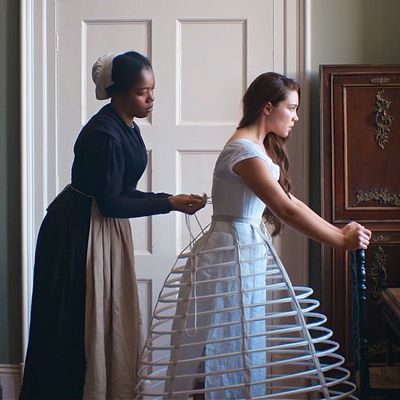
In the gorgeously harsh Lady Macbeth, the then-19-year-old actress Florence Pugh plays young Katherine, who is essentially purchased by an elderly northern England industrialist in the 19th century to marry his son and give his estate an heir — which is difficult to accomplish given that her new, abrasive spouse prefers her to face the wall, naked, while he noisily pleasures himself. By day, she is commanded not to venture out of doors, and so she sits, her waist tightly corseted, her hoop skirt spread wide, on a sofa, awaiting the return of the man who will only make her feel belittled, attended to by a black maid named Anna (Naomi Ackie) plainly too timid (or terrified) to bond with her mistress in their shared servitude.
What feels modern in Lady Macbeth is Pugh’s Katherine, who manifests an extreme aversion to demureness. She has flashing, insolent eyes on a face as wide as a painter’s canvas, and her throaty voice drips with irony and contempt. There are stunning shots of Katherine striding along the windswept coastal moors that summon comparisons to the Brontës and Hardy, but Northumberland borders the Scottish Lowlands and the trace of a brogue allies her not just with dominated women but dominated people of all kinds. The audience roots for Katherine to give it back to her smug white quasi-captors on behalf of all subjugated people everywhere. This becomes a problem when Katherine begins to kick not just up but down.
Director William Oldroyd and screenwriter Alice Birch have made quite a few changes in adapting the 19th-century Russian writer Nikolai Leskov’s novella Lady Macbeth of Mtsensk. The title is now even more inapposite than the original’s: While Shakespeare’s Lady M cries out to her gods to “unsex” her so that her feminine generosity won’t interfere with the plan to compel her husband to butcher a sitting king, Leskov’s protagonist is emboldened by a sexual obsession with a ruffian servant. (She’s also a victim of that corrosive indolence depicted in so many late-czarist novels and plays.) The Katherine of Lady Macbeth doesn’t even have the guilt-induced nightmares of her literary predecessors. She’s more like the Hedda Gabler of Northumberland.
Oldroyd made his name as a theater director, and in his debut film he goes with his strengths. Lady Macbeth is largely confined to the plain, masculine house and its stables, and Oldroyd and cinematographer Ari Wegner show the grinding unsensuality of the place without resorting to the kind of overlong shots designed to make us literally experience her boredom.
They subtly establish a second protagonist, the maid Anna, who is even more cruelly abused by the old master (Christopher Fairbank) and later spies on Katherine and her stable-boy lover, Sebastian (Cosmo Jarvis), through a keyhole. From our modern, liberal perspective, it’s tempting to see Katherine’s revenge on the decrepit industrialist as payback for Anna’s humiliation as well as her own. When a photograph is taken of her beside the upright open coffin of the dead geezer — who has also brutally whipped the lowly Sebastian — we want to cheer.
Movies are games of moral relativism, though, and Lady Macbeth quickly turns its feminist heroine into something far more disturbing. It’s one thing for a woman to murder overpowerful white misogynists, another to shoot her husband’s horse, which whinnies in agony. And the movie’s racial overtones are thunderous. The perpetually traumatized Anna is black. A little boy who shows up midway through — Katherine’s husband’s adorable illegitimate child and ward — is of mixed race and excruciatingly vulnerable. Sebastian’s complexion is on the dark side, too, Jarvis being of Armenian extraction. When you introduce race, white feminism tends to fly out the window — as Sofia Coppola learned after a deluge of criticism for culling a black character from her remake of The Beguiled. Applause for having trained the female gaze on a demonic-female myth has quickly yielded to abuse for being a privileged white woman allegedly minimizing the horror of slavery.
Oldroyd and Birch make no such gaffes. The movie’s larger point — which I find irrefutable — is that some people who have been victimized for life are not just inclined to speak truth to power but to abuse what power they have over people with less of it. August Wilson knew that, which is why his plays resonate far beyond melodrama. So does Lady Macbeth. It eats into the mind with its vision of evil as a contagion that transforms victims into oppressors.
*This article appears in the July 10, 2017, issue of New York Magazine.





